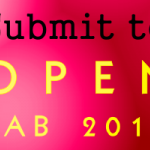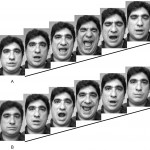
Here at Thoughtful Animal headquarters, we are conducting series of seven-question interviews with people who are doing or have done animal research of all kinds - biomedical, behavioral, cognitive, and so forth. Interested in how animal research is conducted, or why animal research is important? Think you might want to do some animal research of your own someday? This is the interview series for you.
Dr. Zen Faulkes (website, twitter) is Associate Professor of Biology at the University of Texas-Pan American, where he studies the evolution of behavior and nervous systems, particularly the…
I'm not going to create a new category for this creature, because I never expect to blog about these critters again. At least it's clear that she's a mammal.
A zedonk, an unusual cross between a donkey and a zebra, is attracting attention at Chestatee Wildlife Preserve in north Georgia after being born there about a week ago.
The animal, which has a zebra father and a donkey mother, has black stripes prominently displayed on her legs and face.
C.W. Wathen, the Dahlonega preserve's founder and general manager, says the foal has a zebra's instincts. Wathen says she sits up instead of lying on…
Have you heard about NCBI ROFL? It's a previously-independent blog that has been incorporated into "Discoblog," one of the blogs at Discover Magazine. What they do is find amusing or funny abstracts by searching Pubmed (which is run by the NCBI - National Center for Biomedical Information) and just post the abstracts. No commentary, no interpretation, just the text of the abstract. A lot of times I actually find the abstracts that they choose to post amusing. It is amusing that someone has decided to use superglue to remove objects that are stuck in peoples' ears, or that wooden kitchen…
BYU students made a spoof of the Old Spice ads, about studying. Did you know that eight out of five dentists say that studying in the library is six bajillion times more effective than studying in your shower?
(h/t The Education Standard)
A French selection for today: Slave by François Feldman.
(Lyrics in French with an English translation.)
Like the headline says.
I've been thinking about setting up a schwag shoppe, and so I'm going to need a logo. So I'm turning to you, my brilliant readers who (I hope) are far more photoshop-proficient than I am. Though I did make my own banner in photoshop, which I think is pretty awesome, if I may toot my own horn. (Of course I can toot my own horn, its my blog!)
So anyway, who wants to make me a logo? If you've been reading my blog, you know the kinds of things I write about. If I pick your design, you will receive glowing praise from me in blog and twitter form, as well as a free item…
Here are my Research Blogging Editor's Selections for this week:
EcoPhysioMichelle explains a giant methods FAIL on a recent paper that "claims that women who are approaching menopause become 'more willing to engage in a variety of sexual activities to capitalize on their remaining childbearing years.'"
NeuroKuz wonders, "Is it really possible to empathize with and emotionally respond to a robot while simultaneously knowing that it is just a robot?" What is the human neural response to emotional robots?
Eric Michael Johnson brought the Primate Diaries in Exile Tour to David Dobbs' Neuron…
This is a tamarind:
The fruit pulp is edible and popular. The hard green pulp of a young fruit is considered by many to be too sour and acidic, but is often used as a component of savory dishes, as a pickling agent or as a means of making certain poisonous yams in Ghana safe for human consumption.
The ripened fruit is considered the more palatable as it becomes sweeter and less sour (acidic) as it matures. It is used in desserts as a jam, blended into juices or sweetened drinks, sorbets, ice-creams and all manner of snack. It is also consumed as a natural laxative. (via wikipedia)
This is a…
In general, the ability to attribute attention to others seems important: it allows an animal to notice the presence of other individuals (whether conspecifics, prey, or predators) as well as important locations or events by following the body orientation or eyegaze of others. We've spent a lot of time here at The Thoughtful Animal thinking about how domestication has allowed dogs to occupy a unique niche in the social lives of humans. They readily understand human communication cues such as eye-gaze and finger-pointing, and capitalize on the infant-caregiver attachment system to have their…
PZ Myers tipped me off to a science poetry contest:
Dr. Charles is having a Poetry Contest, with wonderful prizes to be awarded to the winner with the best poem about "experiencing, practicing, or reflecting upon a medical, scientific, or health-related matter."
Rules, details, and submission guidelines here.
And if you do come up with some good ones, please consider blogging them, and submitting to Open Lab, which will include at least one poem.
Did you know that Scienceblogs has a vision statement? It might be hard to find. You have to scroll alllllllll the way down to the very bottom of any page on the network, and click About Scienceblogs.
Here is what it says:
Science is driving our conversation unlike ever before.
From climate change to intelligent design, HIV/AIDS to stem cells, science education to space exploration, science is figuring prominently in our discussions of politics, religion, philosophy, business and the arts. New insights and discoveries in neuroscience, theoretical physics and genetics are revolutionizing our…
So this year, super science blogger Ben Young Landis was supposed to be guest editor for Open Lab, but alas, he has gotten a new job and will be moving and will no longer be able. So that meant that series editor Bora, aka the Blogfather, aka Papa Smurf, needed a new editor.
And he picked ME!
So I am very happy to announce that I'll be editor for Open Lab 2010, which I am very excited about, especially because I know it means I will be up to my eyeballs in awesome science writing. And you know, because now I have something to do with my hours and hours of free time :-)
If you aren't yet…
There's been lots of talk lately about the future of science blogging, in general, and the purpose and nature of blogging communities or networks, more specifically. If you haven't read Bora's post, you should. Even if you aren't specifically interested in SCIENCE blogging, as it relates to new media in general.
From the outset I will state that I still am unsure about my future at scienceblogs. When I do make a decision, it will be carefully considered, and I will be confident in my decision. I have not been around long enough to feel fed-up with things here. Though I can also see that those…
Here are my Research Blogging Editor's Selections for this week:
Scicurious delights and entertains while explaining a study all about rat urine, in song and rhyme. She instructs: If You're Happy And You Know It, Smell Some Pee.
Christian Jarrett of BPS Research Digest asks, Did you see the unicycling clown?
More Vodka! It should all taste the same, considering vodka is just water and 40% ethyl alcohol. Right? Torah Kachur of Science in Seconds explains whether different types of vodka actually taste different.
And finally, a post of my own: do dogs have contagious yawning?
From the archives...
Figure 1: Does Mickey feel empathy?
It probably depends on how you define empathy. Empathy, by any definition, implies emotional sensitivity to the affective state of another. Sometimes the empathy response is automatic or reflexive, like when babies start to cry upon hearing another baby crying. Sometimes a strong cognitive component is required, such as for compassion. A more specific understanding of empathy requires similarity between the affective states of the observer and the observed, with an understanding that the observer feels a certain way because he has…
Only a few minutes today to get out a few interesting links, because I'm busy writing up an IACUC proposal.
First, a post on dogs from one of the Psychology Today blogs. I think he's mostly wrong. And will probably spend some time over the weekend writing a post about it.
Second, another post on dogs from Jesse Bering's blog at Scientific American, Bering in Mind. This one I can get behind.
Why do I have dogs on the mind so much this week? Because I'm prepping for a short "mini-course" I'm teaching to Intro Psych students this Fall, on dog cognition. Here's the summary I wrote up:
How do dogs…
It's been a pretty long stressful week around here, and not just because of Pepsipocalypse and the resulting fallout. But, well, I'm back, and I have an awesome paper to tell you about. When I saw it I just KNEW it had to be blogged.
Mythbuster Adam Savage sets the yawning in motion in Mythbusters attempts to start a yawning epidemic across the globe
Did watching that video make you yawn? Chances are it did, and you can thank contagious yawning for it. What is contagious yawning? Contagious yawning is a very well-dcoumented phonemenon wherein yawning is triggered by the perception of others…
Here are my ResearchBlogging Editor's Selections for this week.
First, something near and dear to our hearts. BPS Research Digest explains a recent paper investigating the links between bloggers' personalities and their word choices. "Some commentators have suggested that the internet allows people to present idealised versions of themselves to the world. Contrary to that idea, Yarkoni found that bloggers' choice of words consistently related to their personality type just as has been found in past offline research."
A relative newcomer to the Psych/Neuro blogging community, Mike Lisieski of…
Well, well, well. After spending the day dismantling and rebuilding my lab (which, to my slight surprise, was actually super fun), I return to some good news (relative to the bad news that's been flying around here over the last couple days).
1. The Pepsi blog has been shuttered. Here's the official notice from SEED/SB founder and CEO, Adam Bly. Note that he asks for comments and seems to be reading them. Head on over and participate in the conversation.
2. Carl Zimmer and Dr. Skyskull are both maintaining lists of where to find those who left. (Thanks, dudes!)
3. Aforementioned founder and…
Dudes, I don't even drink soda. Of any kind. Ever.
Seriously, though, I'm saddened by the loss of several of my sciblings. Many of them are individuals who I consider role models, and look up to. Dr. Skyskull is attempting to keep a list of new locations for them, here, and I've been adding links to responses to this debacle on the bottom of yesterday's post - I'm sure I've missed a few, though. Several other sciblings of mine are taking the wait-and-see approach that I advocated yesterday.
To their credit, SEED and Scienceblogs are making some of the requested changes. You'll notice that…







